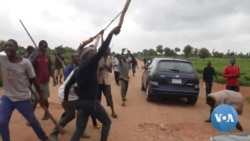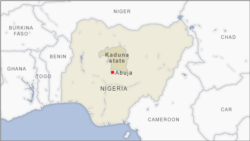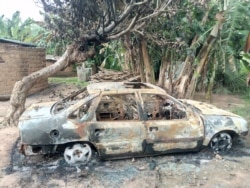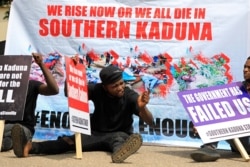After a spate of killings in Nigeria's Southern Kaduna state, Christian residents upset with a lack of security in their villages began standing up to Muslim attackers by establishing their own patrols. The lightly trained guards, armed with whistles and sticks, staff strategic spots to keep watch and announce any unusual movements in their communities.
Wielding locally made weapons and sticks, some 30 men in this Kurmin Masara village in southern Kaduna chant angrily as they march from house to house on patrol.
They express hurt over recent killings by suspected Muslim attackers and are putting their lives on the line to defend their community since it was attacked on August 6.
Augustine Waisiza is the village youth head. He addresses the men before they dispersed to their duty posts to keep watch.
"We're not happy with what is happening in our community,” he said. “These people can kill you with a cutlass and cut you like an animal. The government knows about this and has been quiet,” he says. “They don't like us."
It is now normal for villagers to be on patrol in the village. But apart from the men on patrol, the village is unusually quiet. Farming activities have come to a halt and all the markets remain closed down.
Twenty-seven-year-old Yakubu Nuhu, a local village guard, managed to get his family to safety the night of the attack. He then returned to join forces with other men to protect the village from attackers.
But it bothers him that they are outnumbered, have no training and wield less sophisticated weapons.
"It was by luck I escaped the attack that night. That's why I joined the group to protect our village," he said.
Dozens of people have been killed in villages throughout southern Kaduna in a recent ethno-religious uprising that started in early July.
Nigerian authorities responded to the killings by increasing security in the affected places.
But protesters who marched in Abuja, Kaduna and Lagos demanding an end to the violence are also accusing official security officers of sabotage, and say they want them withdrawn from their villages.
Beevan Magoni, a journalist whose niece was killed in an attack on his village, led the protest in the capital city of Abuja.
"Our people are just clerical staff in our own state," he said. "We're saying we've had enough. Stop killing our people, divide our state. If you're not going to stop killing our people, then take away the security that you have put in our place, because the curfew is in place and our people get killed at night."
Lawrence Alibi, a retired commissioner of police and security expert, says he worries about the low confidence levels between the people and security officials.
"Without the people, the security agencies will not succeed. It's through the people that they'll be able to get the information of what is happening, because some of these people even live amongst them. So, I think it's important that the security agencies make themselves worthy of the trust of the people, confidence-building," said Alibi.
Three feuding groups in southern Kaduna comprising the Atyap, Fulani and Hausa communities in Zangon-Kataf, a restive area in the region, have signed a peace pact and want to establish a joint conflict resolution committee.
But until then, local villagers like Yakubu Nuhu say they will remain vigilant.















